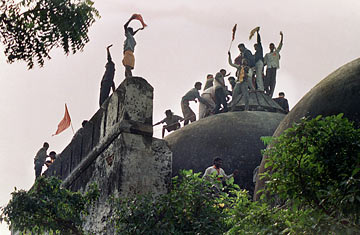
Hindu youths clamor atop the 16th century Muslim Babri Mosque on Dec. 6, 1992, five hours before the structure was completely demolished by hundreds supporting Hindu fundamentalist activists
Even as Prime Minister Manmohan Singh arrived in Washington Monday to represent an India emerging as a cosmopolitan economic powerhouse, his Parliament sent an ugly reminder that the world's largest democracy has a dark side: both chambers of India's Parliament have had to be adjourned repeatedly over the past two days amid a furor over leaked findings of a judicial inquiry into the destruction of the Babri mosque in Ayodhya in 1992.
The mosque was destroyed by Hindu extremists in order to rebuild a Hindu temple that had stood on the same site hundreds of years earlier, and it triggered a wave of Hindu-Muslim violence that left more than 2,000 people dead. Seventeen years later, leaks from the report of the Liberhan Commission (named for the presiding judge), which allegedly held some current leaders of the opposition Bharatiya Janata Party (BJP) culpable for the destruction of the mosque, provoked scuffles in Parliament, offering a reminder that beneath the "Shining India" image of modernity the BJP had once proclaimed lie some ugly, unresolved communal tensions.
The Liberhan report had been submitted to Prime Minister Singh on June 30, after which the government was required to produce an action-taken report (ATR) within six months before introducing the findings for discussion in Parliament. It had planned to raise the topic before Parliament adjourns in December, but earlier this week, the report was leaked to the media. Furious members of the BJP demanded that the government immediately release the report in Parliament, which Singh authorized Finance Minister Pranab Mukherjee to do on Tuesday.
The Liberhan Commission was appointed immediately after the events in Ayodhya, in the northern state of Uttar Pradesh. The Babri mosque, which was built by a Mughal Emperor in 1528, is believed by many Hindus to have been built on the birthplace of the Hindu god Ram, and right-wing Hindu politicians had for years sought to exploit sectarian passions by promising to build a temple honoring Ram on the site of the mosque. On Dec. 6, 1992, amid the sounds of the ceremonial conch, a Hindu mob ravaged the mosque, reducing it to rubble. The act sparked Muslim outrage around the country, provoking several months of intercommunal rioting in which Hindus and Muslims attacked one another, burning and looting homes, shops and places of worship.
BJP leaders have long maintained that the destruction of the mosque had been a spontaneous act, but the new report calls the attack "meticulously planned" and carried out with the approval of senior members of the BJP, implicating L.K. Advani, who had been present at the site, and other top party leaders such Murli Manohar Joshi, and Kalyan Singh, then Chief Minister of Uttar Pradesh.
"It is completely untrue that it was a meticulously planned conspiracy," Advani told reporters after the contents of the report became public. "There was no plan, no conspiracy."
The most controversial name raised in the report is that of former Prime Minister Atal Bihari Vajpayee, a moderate on the BJP spectrum who, while not directly implicated in the attack, was found by Liberhan to have been aware of the demolition and to have done little to stop it. The almost 1,000-page report comes at a particularly inopportune time for the BJP, whose leadership is increasingly fractured and subject to internal power struggles. As it seeks to rebrand itself for a younger electorate that sees communal politics as a thing of the past, the BJP is struggling for an identity. "Ideologically, the BJP is in deep crisis," says Jyotirmaya Sharma, professor of political science at the University of Hyderabad. "If it thinks this [controversy] might bring it back, that's a mistake."
Liberhan is India's longest-serving commission of enquiry, having had its mandate extended 48 times. Judge Liberhan explained the reason for the delay was the reluctance of witnesses to testify. Even as politicians debate its findings, two court cases surrounding the Babri demolition drag through Uttar Pradesh's courts. In Rae Bareli court, India's Central Bureau of Investigation (CBI) has presented eight of its 49 witnesses, with the next hearing set for Dec. 19. Although Liberhan was only a fact-finding commission whose findings and suggestions carry no legal weight, they may give new impetus to the cases currently pending. But concern to avoid creating martyrs for the BJP to rally around and stoke new tensions might prompt the government to let the matter pass.
Prime Minister Singh's government is trying to calm emotions by taking a forward look, suggesting new measures to guard against communal violence. Among its proposals is a new law stating that no political leader in the government would be allowed to simultaneously hold any position in any religious body. But many in India feel that such measures are beside the point, because India's youthful electorate has already left communal politics behind. "These are things of a distant past," says Sharma. "Hindutva, the right-wing philosophy hasn't worked in over two elections and it's not going to work now."
